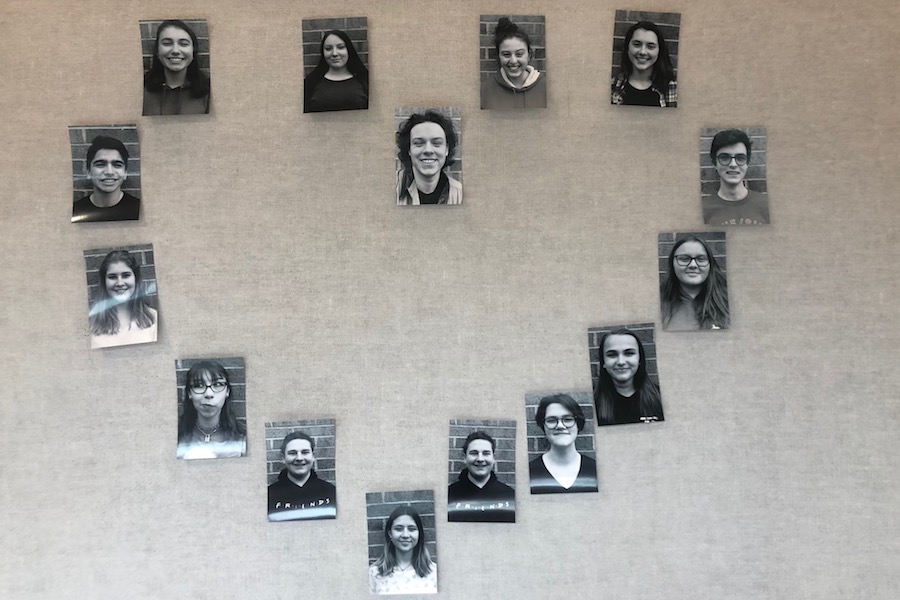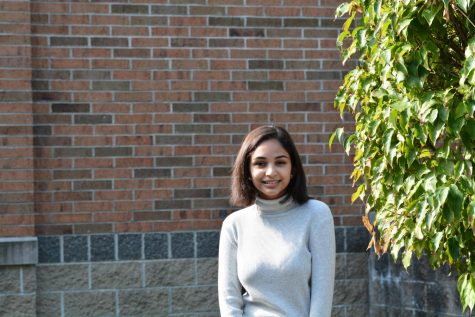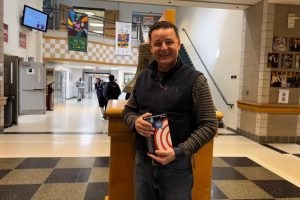Love/Sick explores relationships in the Black Box
The cast and crew of Love/Sick
February 6, 2020
Evolution. Conversations. Roller-coaster. Words the cast and crew of Love/Sick use to describe the show as they gather in the Black Box after a long rehearsal. The long-awaited night before the opening night, the directors advise the cast as they put the finishing touches on each simple, yet intricate motion, while the crew smoothens the transitions from scene to scene.
Love/Sick opens on February 6 at 3 PM, with shows on February 7 and 8 as well in the Black Box Theater. Directed by seniors Ronan Lovely, Elle Whitehead, and Jenna Cuzziere, the play presents an underclassman cast and crew in a series of nine short plays exploring the realities of love in the contemporary age.
“I think this show and just all these little stories really show us the truth. Yes, love is beautiful and really powerful and amazing, but it doesn’t always work out, and it’s not always perfect, and it’s not always amazing,” Cuzziere said. “It’s reality. It’s a sad reality, but it’s also beautiful too because you have these beautiful actors and they convey their story so beautifully, and it’s really touching.”
Assistant Director, freshman Merry Kotary echoed Cuzziere’s words about the imperfections of love. Love/Sick contrasts with traditional, fairy-tale depictions of love to show the audience its nuances and struggles.
“Sometimes love is hard… sometimes you can work it out and sometimes you just can’t. And I feel like a lot of people have to see that,” Kotary said.
As directors, Cuzziere, Whitehead, and Lovely all took the Directing class in their junior year. Theater Arts teacher Michael Towers approached Cuzziere over the summer during WATA’s Summer School for the Performing Arts (SSPA) and told her she would be directing a show in the following school year with Whitehead and Lovely. Though the trio did not originally apply to direct together, they worked well together; Whitehead cited her fellow directors as her favorite part of the directing experience.
“I feel like we just formed such a strong connection through directing together and also getting to work, and giving an opportunity to all these wonderful, hardworking underclassmen, and meeting all of you guys and all of the people involved,” Whitehead said. “It doesn’t matter about the show, just the people that I’ve gotten to work with.”
The trio faced the challenge of selecting a play that could accommodate three directors, an atypical number for most theater productions. In their freshman year, Lovely, Cuzziere, and Whitehead participated in the production Almost, Maine, also written by John Cariani. They decided to bring their WATA experience full circle in their senior year by choosing to direct Love/Sick, which bears similarities to Almost, Maine, but has darker, more mature tones.
“We were like, ‘Oh my gosh, it would work so perfectly if we could split up the scenes, because there’s nine [scenes] and three of us,'” Cuzziere said.
Though all three directors took at least one level of Directing in their junior year, Lovely emphasized the knowledge he gained from his time working on Love/Sick, as opposed to simply taking the class.
“You learn a lot more about what works, what doesn’t work, and there’s so many skills you pick up on that you just don’t get from reading the directing book or from the class- not to say that they’re not really important, good classes to take, but there’s just something you get when you’re in the space, learning, that you just don’t get in the classroom,” Lovely said.
The cast and crew began working on the production in early December. While the cast fervently memorized lines and blocking, the tech crew faced the challenge of accommodating lighting, sound, and backstage work to the Black Box. In terms of lighting, freshman Light Board Operator Noah Ablove focused on the construction of their set and angling the five lights around the room.
“Because if it’s [the lighting] all the same, then it just looks like one big show. So my main focus was how to differentiate the scenes,” Ablove said.
When it came to sound design, Sound Board Operator, sophomore Sophie Sloan, reached out to the cast for ideas for music and songs which would fit with the various scenes in the show. She then compiled the music into a final playlist she uses for the show.
The constraints of space in the Black Box proved a challenge for the set manipulation team. However, they learned to use their space efficiently, picking out storage shelves and artistically draping canvas sheets as a backdrop for the actors, as well as a divider from the storage spaces. Costume designer and set manipulator Lillian Whitehead discussed the team’s efforts in figuring out the logistics of the set and transitions.
“I’m really proud of this team, because they’re all really strong and work really, really hard trying to figure out the logistics of everything; they think of things I wouldn’t have even thought about,” Lillian Whitehead said.
However, freshman cast member Roman Munichiello spoke of the advantages a Black Box production has over the main stage, particularly for the crew and underclassmen.
“The ability to kind of change roles and try something new in the black box is heightened, just because there’s more of an opportunity for underclassmen here. It’s cool to see tech crew who kind of haven’t done it before and getting their, you know, opportunity and seeing kind of what it’s like to be in that role,” Munichiello said.
Just as the crew worked to overcome the challenges the Black Box Theater presented, the cast too faced challenges with the two-sided house design and having to make sure actors were not blocking one another. With the small size of the darkroom, the proximity of the audience to the performance area added a new facet of difficulty for both the actors and the directors.
“In the black box, everyone is going to notice every single sigh or facial expression, which is a really cool acting challenge, but also challenging because the audience is right there,” Whitehead said.
Cuzziere and Lovely noted one of their major problems with the actors and blocking was also the proximity of the performing stage to the audience, another issue caused by the Black Box size.
“They just seem to go too close. And you can’t be too close to the audience or the audience is going to feel like oh my God, this person is a centimeter away. It’s creepy,” Cuzziere said.
Sophomore Nicholas Allegretto, who plays Man, Andy, and Mark in the show, spoke of his personal struggles in the Black Box to avoid any eye contact with the audience.
“They sometimes try to make eye contact with you and you have to avoid that at all costs. Because, first of all, it’s creepy and you’re breaking the fourth wall. Also sometimes when the audience laughs at something that you’re not expecting, it can really catch you off guard and it can mess up the scene,” Allegretto said.
Along with the unique situation the Black Box placed the actors in, as underclassmen they also learned to adapt to Love/Sick, playing roles meant for people much older than they. Freshman Olivia Olszowy, who played Sarah, Jill, and Liz, spoke about the importance of bonding with her fellow cast members.
“It can be a little bit challenging at first, but once you start building an actual real-life bond with that person, it’s much easier to kind of put on that you’ve known them, almost like your whole life,” Olszowy said, “Another challenge is that for most of these plays, these people are married, and obviously none of us have been married, so we don’t really know what that’s actually like, what might look natural or not.”
For Olszowy, sitting down with her scene director and creating a backstory and personality for her character helped to emphasize with her. In a particular scene, developing her character’s story helped Olszowy to better understand how to play the role of a much older woman with children and struggle very differently from her own.
“Honestly, I think that might be one of my strongest scenes, because of how far we really created these characters and their backstory… it was hard, but it was fun,” Olszowy said.
The weeks of hard work the cast and crew put into Love/Sick taught them important lessons, which they hope their audience will take away as well.
“Everyone should come and see this show because you are going to walk out the door at the end feeling satisfied with a good laugh,” Ablove said. “And who knows? You might cry. Well, it’s worth it, because you’re going to love it.”








